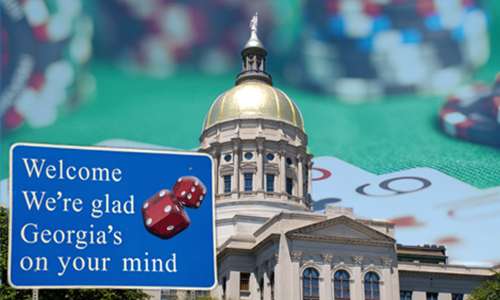New Georgia Casino Bill Coming Soon
The state of Georgia is not exactly a gambler’s paradise. A very conservative state aside from Atlanta and a couple other “blue” pockets, the only legal gambling to be found down here is the state lottery. There has been a gradual strengthening of support for added gaming in the state, though, and in the last couple years, some legislators have pushed to legalize casino gambling. To nobody’s surprise, the bills that would have authorized “resort-style” gambling died early last year, but it appears that some lawmakers will have another go at it in 2017, and possibly soon.
According to the Atlanta Journal-Constitution, Georgia State Senator Brandon Beach (R – District 21) plans to introduce casino legislation in the near future. Despite opposition from social conservatives, religious groups, and businesses, Beach thinks he can succeed.
 The previous gambling bill, introduced in 2015 by State Representative Ron Stephens (R – District 164), would have allowed for up to six “destination casinos” in Georgia in five regions that are laid out in the state’s constitution. Region 1 is by far the largest, including Atlanta and much of the northern half of the state; this region would have been permitted to have two casinos, while the other regions could have one each.
The previous gambling bill, introduced in 2015 by State Representative Ron Stephens (R – District 164), would have allowed for up to six “destination casinos” in Georgia in five regions that are laid out in the state’s constitution. Region 1 is by far the largest, including Atlanta and much of the northern half of the state; this region would have been permitted to have two casinos, while the other regions could have one each.
The goal of legalized gambling would be to fund the HOPE Scholarship. Established in 1993, the HOPE Scholarship helps Georgia students pay for in-state higher education and funds public pre-K programs around the state. Every high school student who earns at least a 3.0 GPA is eligible for a scholarship and can keep it as long as they maintain a 3.0 in college.
The HOPE Scholarship used to pay a student’s entire tuition and even books and fees, but it has become so popular that it has been having trouble funding the scholarships solely through lottery revenue. In 2011, payments for books and fees were eliminated. In 2015, new “academic vigor” requirements were put into place for high school students, as well, requiring kids to take a certain number of upper-level courses. That requirement got stricter in 2016 and will continue to get tougher this year.
“We’re at 71 percent [funding] right now and falling,” Stephens said in 2015. “…We’ve already cut out books and fees and that kind of stuff. Our best and our brightest are staying home, and the revenues are flat.”
Under the previous bill, casinos would be taxed 12 percent on gross gaming revenue, most of which would go to the HOPE Scholarship. The “primary” Region 1 casino would be assessed a $25 million licensing fee, while the fee for the other casinos would be $10 million.
Thus, the desire by some lawmakers to legalize casino gambling.
Beach would introduce two bills, similar to what happened before. One would be a bill to simply authorize casino gambling, while the other would lay out all the rules and regulations. Beach’s bill will share characteristics with the previous bill, but he has made some changes.
Georgia would be divided into four regions, not five. The biggest would span from I-20, which runs east-to-west through the middle of Atlanta, all the way north. The other three would be “Coastal Georgia,” “Middle Georgia,” and “South Georgia.” Up to five casinos and one horse racing track would be authorized.
One operator would be awarded the “primary” casino license and would be required to invest at least $1 billion in a casino property and it would have to be within 25 miles of Hartsfield-Jackson International Airport. The four “secondary” casinos would require a minimum investment of $250 million and would have to be at least 50 miles away from the primary casino. The horse track would require a $150 million minimum investment. All would be regulated and licensed by the Georgia Lottery Corporation.
The tax rate would be 12 percent.
It will not be easy for Beach to get this through the state legislature. It will require a two-thirds majority in both the House and Senate to pass both bills, so even if the authorization bill passes, lawmakers will still have to agree on the details. If they both pass, the decision will then be put to Georgia residents as a ballot measure in 2018.
Then, even if Georgia voters give casino gambling the green light, there is still no guarantee that any will actually be built. Any city or county that wants to have a casino property built will have to allow local residents to vote on a referendum in the next local election.
There is actually a surprising amount of support for casino gambling in Georgia. The AJC conducted a pool at the beginning of the month and found, within an margin of error of four points, that 56 percent of registered voters support casino gambling in the state.
Top Georgia lawmakers, like Governor Nathan Deal, have traditionally been against gambling expansion. House Speaker David Ralston told reporters earlier this month, “We’ve got a lot of decisions we have to make. I’m not sure we’ll be able to make them all this session. And I’m still not sure that casinos in Georgia are consistent with where we want to be as a state.”
For his part, Beach thinks it would be hypocritical of voters to reject casino gambling when the lottery was already approved years ago, saying, “We already have gambling. Now you’re just allowing the voters to decide if they want to have a different type of gaming.”
As mentioned, there will be a ton of push-back from various groups. Conservative and religious groups are naturally enemies of gambling. Local business groups – particularly those in Atlanta – while generally open-minded, also fear that a large resort-style casino nearby would cannibalize their businesses. Local residents who might have spent their disposable income at restaurants, movie theaters, and the like, might take that money to the casino. Music and theater venues, in particular, are wary, as a billion-dollar casino could pay more for acts and leave established venues scrounging for scraps.
Beyond whether or not people actually want gambling, there is also a debate on where the revenue should go. Most (but not all) lawmakers are in favor of using casino revenue to fund the HOPE Scholarship, but even those that want it to go to scholarships want the way it is allocated within education funding to change from the norm.
At a Georgia Hotel and Lodging Association luncheon in November, Rep. Stacey Evans, (D – District 42) said, “….what are we going to do with the money? For me and I think most of my Democratic colleagues to even start this conversation, that money has to go where it’s desperately needed and that’s needs-based aid for college.”
Beach, for his part, fully agrees (*gasp* a Republican and Democrat AGREEING on something!). He told the AJC, “It’s huge for the folks that need help. Even in an area that I live, that is a wealthy area, there are circumstances where kids, their parents have either divorced, or their dad’s passed away or both parents have lost jobs and they’re in the middle of their education and they need help.”



















COMMENTS